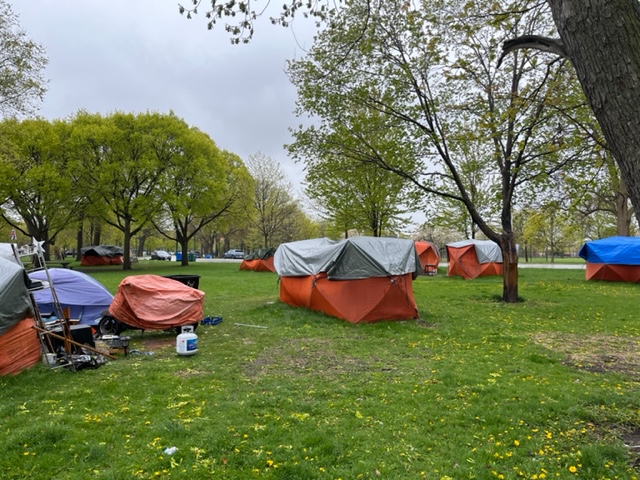Last week here I wrote about how young people can be a pain in the ass to deal with. Well, old people can be, too.
You know how, when young people are super excited about trying to solve an important public issue? And the old people they’re pitching their ideas to sometimes have a faint smile come over their face? And the young people don’t know exactly what it means, except they know they resent it?
As I mentioned last week, I just turned 54. I’m starting to understand what the faint smile means. It means, everything does seem to come in cycles, and those who have been around long enough are starting to see the patterns.
For example:
A couple decades ago, Chicago’s Mayor Daley announced a 10-year plan to “end homelessness in Chicago.” A couple years into that, I pitched a story to Chicago Magazine, on how exactly the mayor was going to go about this. The wisened editor there rejected the pitch with a note that annoyed me at the time. “The homeless,” he wrote wearily, “have been with us a long time.”
Oh! So we’re just giving up on the problem, is that it? His comment rubbed my younger self the same wrong way as an old boss’s claim that, though he appeared to be an old conservative, he was really a “closet radical.” Well what the hell good was that?
The Chicago Reader wound up accepting the homlesss story, and ultimately I was sorry they did, because the reporting was a scramble through an Escher painting of suspect statistics about the homeless population, and a lot of liar’s poker between various factions of city government, watchdog types, and goo-goos of all stripes. I didn’t exactly emerge from the story with a sense of optimism.
And my confidence wasn’t bolstered on the day a photographer and I spent shadowing Carmelo Vargas, the “homelessness czar” Mayor Daley had put in charge of eliminating homelessness in Chicago. How would this urban poverty mastermind go about solving this enormous socioeconomic problem?
“Are you looking for something better?” asks Carmelo Vargas, peering into a makeshift tent on the west bank of the North Branch of the Chicago River. A Streets and Sanitation river patrol reported what looked like a homeless person’s camp, and Vargas, commissioner of the city’s Department of Human Services, took the call himself. To get here, he’d walked a couple hundred yards from Foster Avenue through thick brush in his dress shoes, suit pants, and shirt and tie.
Vargas first called out from a safe distance, “Is anybody home?”
There was no answer. The staffers thought the tent was empty and wanted to move on. But Vargas moved in toward it, and when he lightly touched the plastic tarp, it stirred. Squatting down, Vargas told the occupant he was here to help. The flap slowly opened and a dirty hand emerged, an old watch on the wrist.
Vargas has learned over the years not to ask a homeless man why he’s not living in a shelter. He knows the answers: too many rules, too little freedom to smoke, drink, and come and go as you please.
Instead, Vargas asks the man about himself. What’s your name? Omar. Where are you from? Turkey. How long have you been on the streets? A year. Do you have any family that could take you in? A cousin, in Wisconsin.
“Let me make you a deal,” Vargas says. He offers to put Omar up in a hotel for five days, get him cleaned up, a change of clothes. Then, he says, he’ll call the cousin in Wisconsin and put Omar on a Greyhound bus if the cousin will take him.
Omar is still lying in the tent. He seems hesitant. He says his cousin can’t take him in until next month. “Then I’ll put you up until next month,” Vargas says. “You don’t need to be down here all alone like this.”
Omar accepts. Vargas instructs one of his workers to get him a room at the Milshire Hotel on Milwaukee Avenue, where Vargas can house people for $25 a night using funds from his discretionary budget, and to call the cousin.
Then he hikes the trail back toward Foster. “Good catch, commissioner,” says one of his staff.
Vargas later left under the cloud of a sexual harassment charge.
And now, 19 years into the 10-year plan to end homelessness in Chicago?
The city is working with a private citizen who’s providing tents that the homeless are using to create encampments all over town. Here’s the one I pass by every day on my run through Humboldt Park. Sometimes they’re grilling outside and I’m tempted to stop and see what’s cooking. The tent on the left below has a motorcycle parked outside, under a tarp.

So yeah, the next time someone shows up with a bright idea to end homelessness in Chicago, my lip will probably curl a little, involuntarily. And that will be bullshit on my part. But it won’t be personal. Nevertheless, consider this post an apology in advance.
Yes, nothing changed because of your story, and as I recall, you didn’t just gullibly write down what the city officials were saying. But the snarky comment from the “wisened” — I should you should said “wizened” — editor is still way out of line, and you should retain your younger-self annoyance. Then and now, Chicago magazine has continued to devote acres of space to pizza, and that has also been around for a long time.
Fuck I get wizened mixed up with grizzled.
And I don’t know why I’m compelled to say it, but that might have been the editor’s way of saying Daley’s plan was nonsense and he didn’t want to put his readers through seven heavily un-fun pages watching me try and fail to prove it.